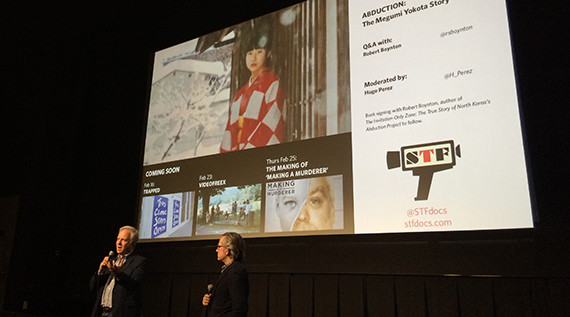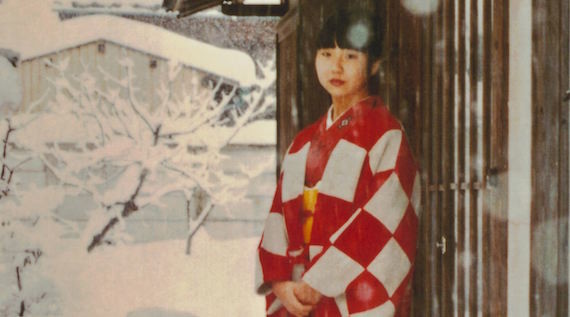
© Cailley Frank-Lehrer
Recent favorites like Serial, The Jinx and Making a Murderer have sparked a widespread obsession with mystery documentaries where the layers are slowly peeled back to reveal the truth. But ABDUCTION: THE MEGUMI YOKOTA STORY set a high bar back in 2006, so chances may be you haven’t seen it. The documentary is currently not available on streaming favorites like Netflix and SundanceNow Doc Club (I’ll cross my fingers for you that that changes soon). The gripping story of a 13-year Japanese girl kidnapped by North Koreans has enough twists and turns to leave even the most suspense-hungry viewers utterly satisfied.
During Tuesday night’s screening at Stranger than Fiction at the IFC theater, author of the book The Invitation-Only Zone: The True Story of North Korea’s Abduction Robert Boynton joined moderator Hugo Perez on stage. Boynton’s book explores the phenomena of Japanese and South Korean kidnappings by the North Korean regime. Some of the kidnappees were eventually allowed to return to Japan following large-scale social protests spearheaded by the victims’ families.
In one particularly arresting scene, viewers are taken into the room where a North Korean defector who participated in these kidnapping missions is being interviewed.
“It’s not that hard to kill someone,” he says matter-of-factly. “It’s like animal.”
His voice rises and he notes in a frighteningly-genuine way, “It’s easier.”
However, even the most psychologically damaged individuals are capable of possessing a heart. “I was really sorry North Korea deprived such good parents their daughter,” he states, while cluing viewers into the underlying theme throughout the film: a parent’s eternal love for their child.
The images are intense: An abductee’s severely depressed and aged mother moaning to a home-video camera about her missing son while on her deathbed. Parents protesting outside of LDP headquarters (Japan’s ruling party) for years upon years, screaming at the top of their lungs, “Please take the accusation issues seriously!” and “Give us our sons and daughters back, you assholes!” A video-note from a father to his captured daughter thousands of miles way. “We have a Disneyland now,” he says with a hopeful smile.
As unbelievable and fascinating this story seems, many may not realize that these kidnappings had an incredibly negative effect on Japanese perceptions of North Korea. According to a 2014 BBC World Service poll, 91% of Japanese viewed North Korea negatively, with just 1% expressing a positive view; the most negative perception of North Korea in the world.
Boynton said during Tuesday night’s Q&A session that this story completely disappeared from western media in the wake of September 11th. Even today, the contemporary and ongoing issue of North Korean abductions is still overshadowed by the sexier topic of nuclear weapons.
“Human rights always get trumped by nukes.” Boynton said.
Boynton is the director of NYU’s magazine journalism and Literary Reportage programs and has written for The New York Times Magazine, The New Yorker, The Atlantic, The Nation, and elsewhere. After reading an article from The New York Times on the release of five Japanese hostages after decades in North Korean enforced captivity, Boynton was immediately drawn to the topic. The article sparked several years of reporting in Japan and the birth of his book The Invitation Only Zone: The True Story of North Korea’s Abduction.
Boynton said that he put himself in the parents’ shoes and just couldn’t imagine 25 years of not knowing.
Spoiler alert for those unfamiliar with this unraveling of events— the North Korean government finally admitted in 2002 that it had kidnapped 13 Japanese citizens during the time between 1977 and 1983. These Japanese young adults were reportedly being used by North Korea to train North Korean citizens in the Japanese language and culture, allowing North Koreans to pose as Japanese nationals in various parts of the world, but to function truly as spies. After high-profile visits by Japan’s Prime Minister to Pyongyang, North Korea returned five of the thirteen hostages. The other eight purportedly died in various manners: car crashes, drowning, gas chambers and suicide.
Does Megumi Yokota, the main character of the film, fall into this group? You’ll have to watch the documentary to find out.
Jenna Belhumeur is a recent graduate of the Columbia University Graduate School of Journalism, and currently works within the video department at The Wall Street Journal. Follow her on Twitter @jenna_bel.
Related Film






